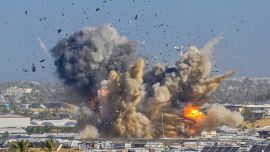The highly polarised conflict between two opposing options is over and the rules of democracy dictate that this new government has established, beyond any discussion, its right to define policy for better or for worse, whether one likes it or not. The immediate question this year is a different one – not whether the government has a mandate to pursue its plan but whether it has one, whether it knows what it wants and whether some of the means towards the ends chosen are not counterproductive to its own aims.
Just a couple of examples to illustrate this question from a hectic first three weeks barely interrupted by the Christmas and New Year holidays. Irritating as it might be for globetrotters, the 30 percent tax slapped on credit card spending overseas not only lies within the new government’s theoretical right to set policy but also has some technical arguments in its favour – not even the most ardent admirer of the previous president Mauricio Macri could defend tourist sprees in Miami as the best possible use of the freedoms offered by his administration. But having said this, it leaves open the question of whether this government knows what it wants because it pursues two contradictory aims – to staunch the haemorrhage of dollars abroad and to fund council housing schemes. If it does indeed discourage travel abroad, it will not generate much revenue while if it does, it will not prove a very effective capital control.
Perhaps a more important example is the past week’s U-turns over petrol prices. The five percent increase proposed by the new YPF chief Guillermo Nielsen, with a view to sending a positive message to potential Vaca Muerta shale investors, was not opposed by President Alberto Fernández until almost the last minute before its implementation, when he had a panic attack over the likely impact on this month’s inflation figures. Yet the dream of Vaca Muerta as a cash cow (no pun intended) remained strong enough for Fernández to postpone the implementation of liquid fuel and carbon emission taxation (equivalent to around three percent of the total price) until next month with the last decree of 2019. The damage has already been done, however – not only does the scale of investments required to tap Vaca Muerta fully work with a rather longer-term perspective than from one month to the next but price intervention so early in this presidency in line with political criteria sends out a disastrous message when even steep nominal increases would still leave Argentina badly behind international dollar prices, given last year’s devaluation of 60 percent.
Always assuming that those global oil prices remain steady – something which seems highly unlikely, following the slaying of Iranian Revolutionary Guard commander Haj Qassem Soleimani and Hezbollah leader Abu Mahdi al-Muhandis in Iraq yesterday. This brings up a further doubt concerning the new presidency – not only do we lack assurance that it has a plan and knows what it is doing but its domestically driven agenda severely underestimates the importance of defining Argentina’s place in the world. Fernández was clearly thinking exclusively of national politics (and especially his own complex coalition) when he lurched into what is being perceived by some as another of this week’s U-turns – stating that evidence is lacking to consider the death of special prosecutor Alberto Nisman almost four years ago to be a murder at the same time that a 2017 documentary by Netflix (curiously subject to eight percent under the new tax, not the full 30 percent) shows him expressing doubts about suicide. To be fair to the new president, Nisman’s death continues to be a strangely baffling case where both murder and suicide seem implausible for different reasons but given Nisman’s insistent probes into Tehran’s responsibility for the 1994 terrorist car-bomb destruction of AMIA Jewish community centre, these remarks are unintentionally horribly timed when world peace once again hangs in the balance over Iran.
In conclusion, this new government not only needs a plan but also a global vision extending rather further afield than the Malvinas, where the British presence was repudiated on its 187th anniversary yesterday.


















Comments